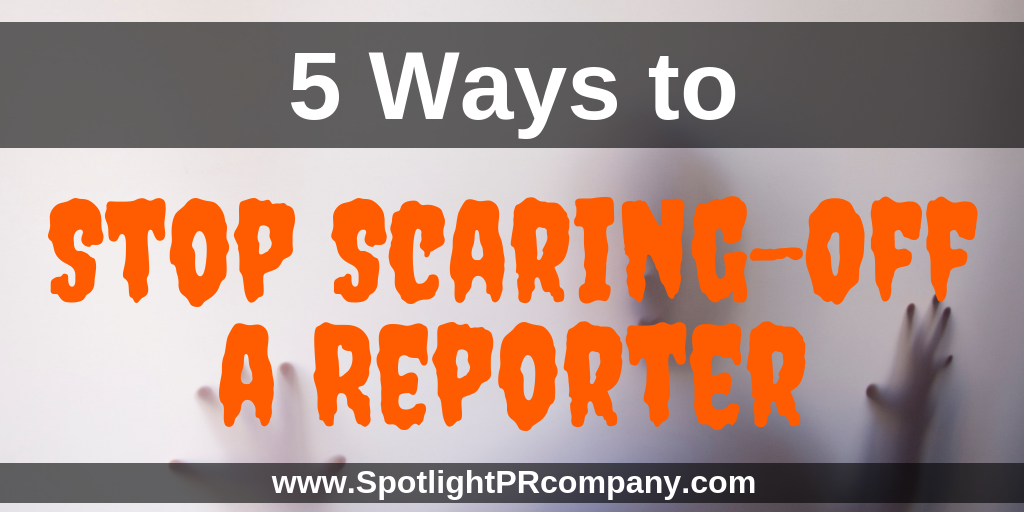5 Ways to Stop Scaring-Off a Reporter

Reporters are constantly on the hunt for a good story – that’s their job. But, what is considered “good” for one is not going to be suitable for all. This is where things can get a little tricky.
The last thing you want to do is give a Reporter a reason to “pass” on your story simply because you don’t know the protocol of pitching them. And, I believe it all starts with how you treat a Reporter.
I’m not saying that anyone is being bad on purpose. I’m merely suggesting that some Actors and Filmmakers might not know what is and is not appropriate when reaching out to the press.
To help you understand, I’m sharing 5 Ways to Stop Scaring-Off a Reporter:
1. Don’t Be a Stalker
It’s important to understand that Reporters are busy. Some of them get hundreds of story pitches per day. So, be smart about how you approach them. Most Reporters prefer an email to start. Then, give them enough time to actually see your email before doing any sort of follow-up, either by email or with a phone call. If you’ve reached out 2 or 3 times without getting a response back, then consider that your answer and move on. Also, if you want to reach out using social media…pay attention to their social habits first and you’ll probably discover if they’re accepting pitches that way.
2. Don’t Confuse Them
Every story has many angles or ways to cover it. But, a Reporter doesn’t have time to review all of them to find one that fits their needs. This is why it’s important for you to uncover the type or style of stories each Reporter or press outlet covers. That way you’ll be able to fine tune your idea to match their audience. For example, if someone only handles critical reviews, then don’t pitch them an in-depth feature story…and vice versa.
3. Don’t Go Missing
This may seem obvious, but it’s important that you stay ready, alert and available throughout a press campaign. You would be surprised how many Actors and Filmmakers/Creators don’t do this. Nothing frustrates a Reporter more than asking for more information and not being able to get it…or they want to conduct an interview, but they can’t schedule it. So, be sure to create proper materials before you start a campaign – like a press release, biography, EPK, images, filmmaker’s statement and more. Also, make sure you keep some flexibility in your schedule to answer questions – these can be an in-person meeting, a quick phone chat, a video streaming interview or even written questions needing your response.
4. Don’t Lie
Everything in your life (and career) isn’t always perfect…you’re human. We all work on projects or with individuals that later we wish we hadn’t – but you can’t say that, right?! You might even have some personal details that you’d prefer aren’t shared with the world, like your age, relationship status, political affiliation, etc. But, when you’re in the midst of a press campaign, it’s possible that these sticky situations might come up. Most Reporters aren’t out to get you by digging up the dirt, they simply stumble upon these issues by accident. So, don’t panic and lie about your experience or your age. Instead, I suggest that you prepare a positive response that fits your personality, answers these questions and leaves you feeling comfortable, not worried.
5. Don’t Expect Miracles
I’m a big believer in keeping it real. What I mean by that is simply focusing your efforts on the “right” Reporters or press outlets. Television Reporters don’t usually cover film projects…so don’t expect them to stray from their normal beat just for you. Before you start, do a little research and streamline your outreach to the most appropriate opportunities. Also, make sure you start early enough that you give Reporters time to turn your story around without expecting them to drop everything else they’re currently working on to write your story – that’s not going to happen. So, instead of wishing for a miracle, try setting yourself up for press success from the start.
Overall, my advice goes back to a piece of wisdom that I’m sure you’ve heard before: treat a person (or Reporter) the same way you would like to be treated — with respect.
THANKS!


Follow Spotlight PR